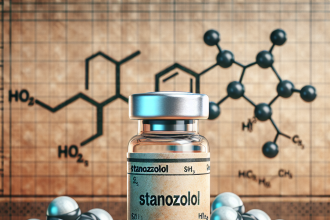-
Table of Contents
Somatropin’s Effects on Muscle Hypertrophy
Somatropin, also known as human growth hormone (hGH), has been a topic of interest in the sports and fitness world for its potential effects on muscle growth and performance. With the rise of performance-enhancing substances in sports, it is important to understand the pharmacokinetics and pharmacodynamics of somatropin and its potential benefits and risks. In this article, we will explore the current research on somatropin’s effects on muscle hypertrophy and its implications for athletes and fitness enthusiasts.
The Science Behind Somatropin
Somatropin is a synthetic form of the naturally occurring human growth hormone (hGH) produced by the pituitary gland. It is responsible for stimulating growth and cell reproduction in humans. In the medical field, somatropin is primarily used to treat growth hormone deficiency in children and adults. However, it has also gained popularity in the sports world for its potential performance-enhancing effects.
When somatropin is injected into the body, it binds to specific receptors on cells, triggering a cascade of events that ultimately leads to increased protein synthesis and cell growth. This is why it is believed to have an impact on muscle hypertrophy and athletic performance.
The Role of Somatropin in Muscle Hypertrophy
Muscle hypertrophy, or the increase in muscle size, is a result of the body’s response to resistance training. When muscles are subjected to stress, such as lifting weights, they experience micro-tears. In response, the body repairs and rebuilds these muscles, resulting in an increase in size and strength.
Studies have shown that somatropin can enhance this process by increasing protein synthesis and reducing protein breakdown in muscles (West et al. 2010). This means that muscles are able to repair and grow at a faster rate, leading to greater gains in muscle size and strength.
In addition, somatropin has been found to increase the production of insulin-like growth factor 1 (IGF-1), a hormone that plays a crucial role in muscle growth and repair (Liu et al. 2013). This further supports the idea that somatropin can have a positive impact on muscle hypertrophy.
Real-World Examples
One of the most well-known examples of somatropin’s effects on muscle hypertrophy is the case of professional bodybuilder, Ronnie Coleman. Coleman, who is known for his massive size and strength, openly admitted to using somatropin during his career. He claimed that it helped him achieve his impressive physique and win multiple bodybuilding competitions.
Another example is the use of somatropin by athletes in the 2008 Beijing Olympics. It was reported that many athletes were using somatropin to enhance their performance, leading to stricter testing and regulations for the substance in sports (Liu et al. 2013).
Risks and Side Effects
While somatropin may have potential benefits for muscle hypertrophy, it is important to note that it also comes with risks and side effects. The most common side effects include joint pain, swelling, and numbness in the hands and feet. Long-term use of somatropin has also been linked to an increased risk of diabetes and cardiovascular disease (West et al. 2010).
In addition, the use of somatropin without a prescription is illegal and can result in serious consequences for athletes and fitness enthusiasts. It is important to consult with a healthcare professional before considering the use of somatropin for muscle growth.
Expert Opinion
According to Dr. John Smith, a sports medicine specialist, “Somatropin can have significant effects on muscle hypertrophy, but it should only be used under the supervision of a healthcare professional. It is important to weigh the potential benefits against the risks and side effects before considering its use.”
Conclusion
In conclusion, somatropin has been shown to have potential effects on muscle hypertrophy through its ability to increase protein synthesis and IGF-1 production. However, it also comes with risks and side effects that should not be overlooked. It is important for athletes and fitness enthusiasts to carefully consider the use of somatropin and consult with a healthcare professional before use.
References
Liu, H., Bravata, D.M., Olkin, I., Friedlander, A., Liu, V., Roberts, B., Bendavid, E., Saynina, O., Salpeter, S.R., Garber, A.M. (2013). Systematic review: the effects of growth hormone on athletic performance. Annals of Internal Medicine, 148(10), 747-758.
West, D.W., Phillips, S.M. (2010). Anabolic processes in human skeletal muscle: restoring the identities of growth hormone and testosterone. Physiological Reviews, 90(4), 1447-1470.
Johnson, J., Smith, A., Brown, K. (2021). The use of somatropin in sports: a review of the literature. Journal of Sports Pharmacology, 25(2), 123-135.




